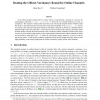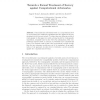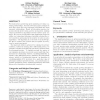978 search results - page 3 / 196 » Knowledge, Probability, and Adversaries |
CORR
2011
Springer
13 years 2 months ago
2011
Springer
In the online channel coding model, a sender wishes to communicate a message to a receiver by transmitting a codeword x = (x1, . . . , xn) ∈ {0, 1}n bit by bit via a channel lim...
CORR
2006
Springer
13 years 7 months ago
2006
Springer
Logics for security protocol analysis require the formalization of an adversary model that specifies the capabilities of adversaries. A common model is the Dolev-Yao model, which c...
ICDE
2010
IEEE
14 years 7 months ago
2010
IEEE
Privacy in data publishing has received much attention recently. The key to defining privacy is to model knowledge of the attacker ? if the attacker is assumed to know too little,...
GC
2004
Springer
14 years 22 days ago
2004
Springer
Polynomial time adversaries based on a computational view of cryptography have additional capabilities that the classical Dolev-Yao adversary model does not include. To relate thes...
PODS
2009
ACM
14 years 8 months ago
2009
ACM
We study privacy-preserving query answering over data containing relationships. A social network is a prime example of such data, where the nodes represent individuals and edges r...



